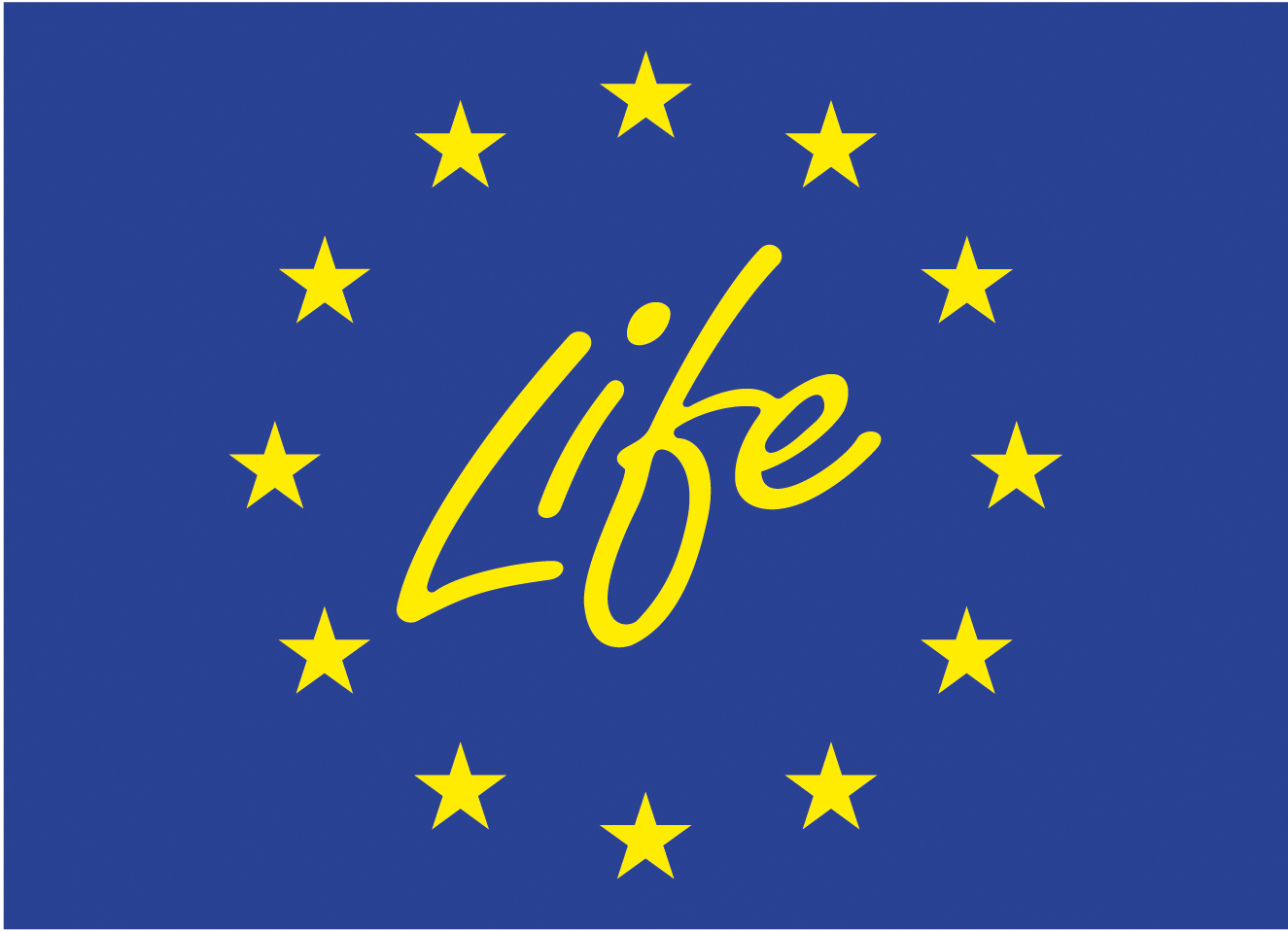More than 1,000 attended our sessions at BIOFACH’s e-Special – 17-19 February 2021, online
On 17-19 February 2021, the first online edition of BIOFACH took place with more than 13,800 participants.
17 February: Opening & launch data on organic
Julia Klöckner, German Minister for Agriculture and Food and Felix Prinz zu Löwenstein, Chairman of the German Association of Organic Farmers, Food Processors and Retailers (BÖLW) opened BIOFACH’s e-Special and welcomed participants and speakers to the first day of the world’s largest trade fare for organic.
One of the first day’s first highlights was the launch of “The World of Organic Agriculture 2021”, published by the Research Institute of Organic Agriculture (FiBL). According to the latest statistics, the organic market grew by €45 billion in 2019. As Eduardo Cuoco, IFOAM Organics Europe Director states “This data shows the European organic market’s potential to reach the objective of 25 percent organic land by 2030 put forward in the EU Biodiversity and Farm to Fork strategies. To reach this target the organic sector needs political support at all levels. This includes a good regulatory framework, adequate support under the CAP – with clear support for organic in the national strategic action plans – and a powerful European Organic Action Plan with concrete actions supporting conversion, market development and capacity building of the European organic sector”.
17 February: Policy Day with the Presidency, Commission & Parliament
During our Policy Day on 17 February, we discussed how to reach 25% organic land in the EU by 2030. We did this in the presence of high-level speakers from the Portuguese Council Presidency, the Commission’s Directorate-General for Agriculture and Rural Development (DG AGRI), the European organic movement and 586 participants.
After the opening by IFOAM Organics Europe Director Eduardo Cuoco, Maria do Céu Antunes, Portuguese Minister of Agriculture, mentioned the four priorities of the Portuguese Presidency for agriculture to promote a resilient Europe. These include reforming the Common Agricultural Policy (CAP) to support sustainable agriculture, strengthening rural development, generation renewal and organic farming, boosting EU food security in line with the Farm to Fork strategy and innovating agriculture through digitalisation. Maria do Céu Antunes believes that the development of organic farming is key in transitioning to a sustainable food and farming system.
Wolfgang Burtscher, Director-General of DG AGRI agreed and stated that everyone in the supply chain, from producers to consumers, will have to work towards reaching this goal. To do so, the Commission needs to ensure sufficient financial support for farmers to convert to and maintain organic farming. He proposed ringfencing 30% of the second CAP pillar for environmental measures (including organic farming), while attributing 20-30% of the first pillar to Eco-Schemes, investing in research and innovation for organic and setting national targets.
Jan Plagge, IFOAM Organics Europe and Bioland President, welcomed that organic is mentioned as part of the solution and emphasised that Member States need to set ambitious targets for organic land in their CAP Strategic Plans, encouraging farmers to make vital economic decisions. Aina Calafat, International Project Manager at Sociedad Española de Agricultura Ecológica/Agroecología (SEAE) added that organic farming needs increased payments as it truly delivers environmental and social benefits. In France, for example, CAP money has boosted organic conversion and maintenance, said Thierry Stoezel, CEO at Ecocert.
The Policy Day panel agrees that reaching 25% EU organic land by 2030 is ambitious but possible with the right tools in place. This includes a strong new EU Organic Action Plan, which is being developed by the Commission and expected to be published the end of March, as stated by Wolfgang Burtscher. To wrap up a successful digital Policy Day, IFOAM Organics Europe Director Eduardo Cuoco announced our European Organic Congress 2021, which will take place on 16-18 June and where we will continue the discussion with the Portuguese Ministry.
If you attended BIOFACH2021, you can relive this session by visiting the event platform.
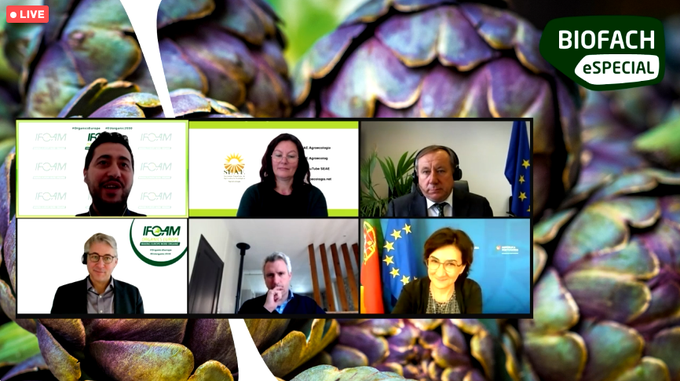

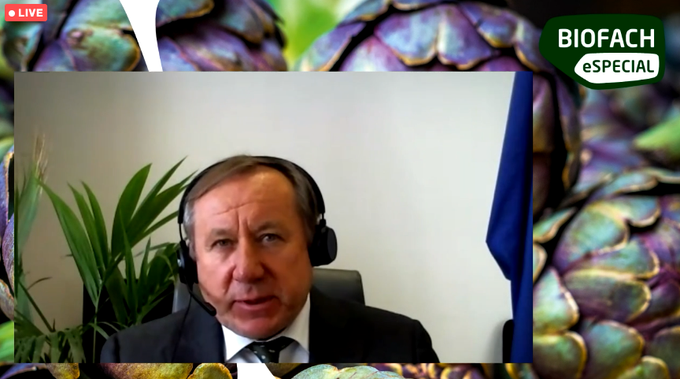

18 February: Impact new EU Organic Regulation on producers & operators
Of course, we also organised a session on the new EU Organic Regulation, moderated by IFOAM Organic Europe’s Regulation Manager, Emanuele Busacca and attended by 435 participants. It took place on the second day of BIOFACH and aimed at providing organic producers and operators worldwide with an overview of the expected changes.
Luis Martin Plaza, Policy Officer in the Organic Unit of DG AGRI, informed participants about the changes related to organic international trade. In the future, control bodies will be recognised for compliance (instead of equivalence) after a transition period until the end of 2024. He was followed by Antoine Faure, Board member of the European Organic Certifiers Council (EOCC), who explained the regulatory changes expected for organic certifiers operating in third countries.
Finally, Florentine Meinshausen, Smallholder Group Certification Expert at IFOAM Organics International told BIOFACH participants about the challenges for groups of organic operators producing coffee, cacao, tea and tropical fruits in third countries. She concluded that even though the new EU Organic Regulation aims at strengthening and harmonizing group certification, especially for larger groups, it is likely to create higher administrative burden, increase costs and lead to drop-outs of organic operators. This makes the provision of guidance and training for certified organic operators by organic associations and institutions even more important. IFOAM Organics Europe Regulation Manager Emanuele Busacca reassured participants that the European organic movement will support its members and the organic sector in this transition.
Were you an attendee and would like to re-watch this session? Visit the event platform.

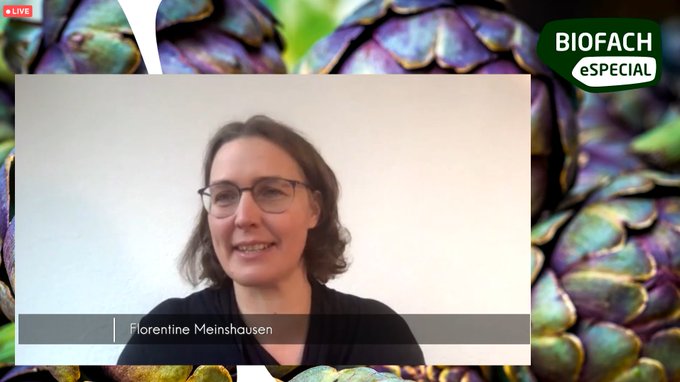


19 February: Organic certification
We ended this year’s BIOFACH with a session on organic certification, where speakers from DG AGRI, EOCC and Ecocert discussed how organic certification should be in the future, considering among others new technologies. Jan Wicher Krol from Skal Biocontrole moderated the session with more than 360 participants and first handed the virtual microphone to Paschalia Koufokotsiou, Team Leader in the Organic Unit of DG AGRI, who elaborated on the why and what of organic certification.
She was followed by Michel Reynaud, Vice-President of Ecocert and IFOAM Organics Europe Board member, who emphasised that organic certification covers the entire organic production system rather than a final product. He further stated that organic certification could be improved by using data collection systems and analysing data more efficiently, which would benefit organic operators, certifiers, and competent authorities. However, he warned that new technologies like the Internet of Things (IoT) are tools to improve and should not be seen as solutions themselves. Georg Eckert, President of EOCC continued that organic production is process-based, so new technologies and availability of big data should be adjusted to that, not simply detect residues.
If you want to relive this session, visit the BIOFACH platform.


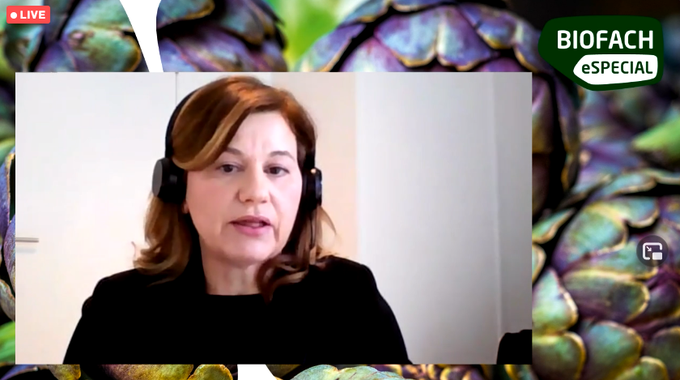
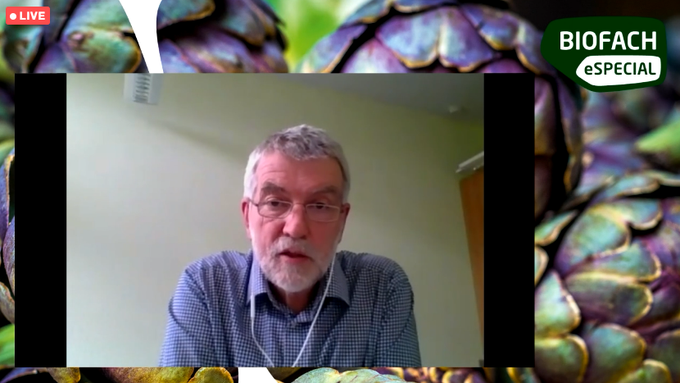
Relive the experience
Attendees can watch the recordings on the BIOFACH platform until August 2021. You can also relive our sessions by going through our Twitter moment and browsing #BIOFACH2021.
We would like to thank BIOFACH/Vivaness for organising this year’s BIOFACH e-Special as well as our speakers, participants, members, and dedicated staff for making our sessions a success.



